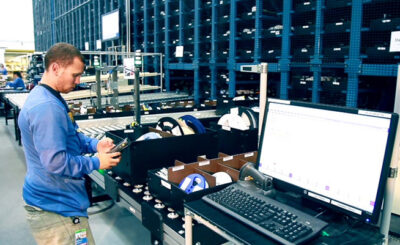In today’s fast-paced world, technology has revolutionised the way we shop and sell. One of the most significant technological advancements in this regard is the Point of Sale (POS) system. A POS system is a combination of hardware and software that enables businesses to process transactions, manage inventory, and generate reports.
Improved Efficiency
One of the most significant benefits of using a retail pos system is improved efficiency. With a POS system, businesses can process transactions much faster than traditional cash registers. This is because POS systems are designed to scan barcodes or read RFID tags, which automatically populate the transaction details. This eliminates the need for manual data entry, reducing the time it takes to process transactions.
Additionally, POS systems can handle multiple transactions simultaneously, allowing businesses to serve more customers in less time.
Inventory Management
Another key benefit of using a POS system is inventory management. With a POS system, businesses can track inventory levels in real-time. This means that businesses can quickly identify when they are running low on stock and reorder before they run out. Also, POS systems can track sales data, allowing businesses to identify which products are selling well and which are not. This information can be used to make informed decisions about inventory management, such as which products to stock and how much to order.
Customer Relationship Management
POS systems also offer businesses the ability to manage customer relationships more effectively. With a retail pos system, businesses can collect customer data, such as contact information and purchase history. This information can be used to create targeted marketing campaigns, loyalty programs, and other initiatives that can help businesses build stronger relationships with their customers.
Additionally, POS systems can generate reports that provide insights into customer behaviour, such as which products are frequently purchased together.
Mobile POS
The rise of mobile POS systems has also had a significant impact on how we shop and sell. Mobile POS systems are designed to work on mobile devices, such as tablets and smartphones. This means that businesses can take their POS systems with them wherever they go, allowing them to process transactions and manage inventory from anywhere. Also, mobile POS systems can be used to accept payments from customers who prefer to use mobile payment methods, such as Apple Pay or Google Wallet.
E-commerce Integration
Another way that POS systems are shaping the way we shop and sell is through e-commerce integration. Many POS systems now offer e-commerce integration, allowing businesses to sell their products online. This means that businesses can reach a wider audience and offer their products to customers who may not be able to visit their physical stores. E-commerce integration also allows businesses to manage their online and offline sales from a single platform, making it easier to track inventory and sales data.
Data Analytics
POS systems are also changing the way businesses use data analytics. With a POS system, businesses can collect vast amounts of data on their sales, inventory, and customer behaviour. This data can then be analysed to identify trends and patterns that can help businesses make informed decisions. For example, businesses can use sales data to identify which products are popular during specific seasons or events, allowing them to adjust their inventory accordingly.
Security
POS systems are also improving the security of transactions. With a POS system, businesses can encrypt customer data, making it more difficult for hackers to steal sensitive information. Additionally, POS systems can be integrated with fraud detection software, which can identify suspicious transactions and alert businesses to potential fraud.
Integration with Accounting Software
Another way that POS systems are changing the way businesses operate is through integration with accounting software. Many modern POS systems offer integration with popular accounting software such as QuickBooks and Xero. This integration allows businesses to automatically sync their sales data with their accounting software, eliminating the need for manual data entry. This not only saves time but also reduces the risk of errors.
Customization
POS systems are becoming more customisable, allowing businesses to tailor their systems to their specific needs. Businesses can choose from a variety of features and add-ons to create a system that suits their unique requirements. For example, businesses can choose to add features such as loyalty programs, gift cards, and customer feedback surveys. This customisation allows businesses to create a system that is not only efficient but also enhances the customer experience.
Cloud-Based POS Systems
Cloud-based POS systems are becoming increasingly popular, and for a good reason. Cloud-based systems offer many benefits over traditional on-premise systems. For one, cloud-based systems are accessible from anywhere with an internet connection, making it easier for businesses to manage their operations remotely. Additionally, cloud-based systems require less hardware, reducing the upfront cost of implementing a POS system.
Training and Support
As POS systems become more complex, businesses require more training and support to ensure they are using the system to its full potential. Many POS system providers offer comprehensive training and support to their customers. This includes online training resources, phone support, and on-site training. This support ensures that businesses can get the most out of their POS systems and can quickly resolve any issues that arise.
Final Thoughts
It’s clear that POS systems are revolutionising the way businesses operate. They offer a wide range of benefits that help businesses improve their efficiency, manage their inventory, and build stronger relationships with their customers. With the rise of mobile POS systems, e-commerce integration, and cloud-based systems, businesses have more options than ever before when it comes to choosing a POS system that suits their needs.
As technology continues to evolve, we can expect to see even more advancements in POS systems, making it easier for businesses to streamline their operations and focus on what they do best – providing excellent products and services to their customers.







